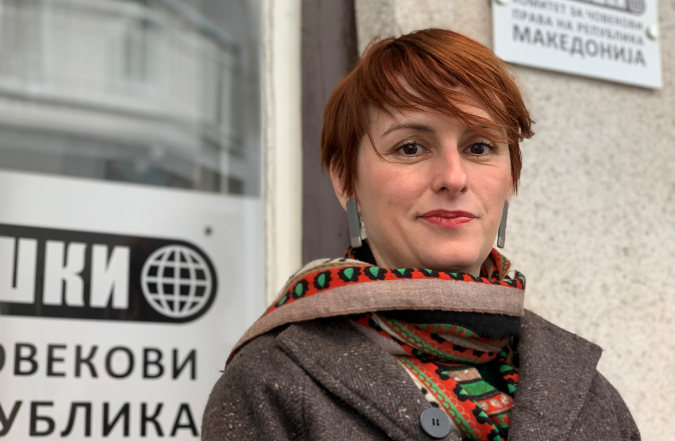In the words of Tatjana Stoimenovska: “We prioritize the protection of the rights of the most marginalized groups”
Date:

Tatjana Stoimenovska works as a Project Coordinator at the Helsinki Committee of Human Rights of the Republic of Macedonia [1] (MHC). She has extensive experience in women’s rights, gender equality and social inclusion. She is currently leading a project aimed at building the capacity of civil society organizations to claim women's rights using human rights-compliant mechanisms, implemented under the European Union-UN Women Regional Programme on Ending Violence against Women “Implementing Norms, Changing Minds.”
“One of the greatest challenges faced by survivors is that the stereotypes prevailing in the country and overall in the region consider domestic violence as a private affair, or even worse, survivors often get blamed for the violence.
As part of our vision and values we prioritize the protection of the rights of marginalized groups and groups that experience the greatest difficulty in exercising and accessing their rights. Women survivors of gender-based or domestic violence are one of these vulnerable groups.
The most important service MHC provides to survivors of violence is free legal assistance. We are the first point of contact for them, whether they contact us by phone or whether they come in person to our offices. We encourage them to report the violence, and in some cases, we help them to acknowledge the violence they are being subjected to, as certain forms of violence, such as psychological and economic violence, are often not easily recognized as such.
First, we advise which steps they need to take in case of violence. On behalf of the survivor, our legal team submits a request to the court for temporary protection measures, as stipulated in the Law for Prevention and Protection from Domestic Violence. We also accompany the survivors to the social work centres, police or doctors, depending on each case.
For certain cases, we also provide legal representation in court by providing an attorney-at-law for the survivor. This service is highly needed, as the women in many cases lack the financial resources for court representation.
MHC has excellent collaboration with other civil society organizations working in the area, thus we put survivors in contact with organizations that provide psycho-social support. This is an important step for them in the process of recovery, regaining their self-confidence and rebuilding their lives.
We also monitor court proceedings to check whether the court follows and respects the legal procedure and the principle of urgency in cases of domestic violence.
In addition to working directly with survivors, MHC works with government agencies to ensure that the country meets its international legal commitments to prevent violence against women and girls. Upon the ratification of the Istanbul Convention by the country, we believe that all partners (NGOs, donors, government) should focus on applying the standards of the Convention.
As an NGO with a strong legal background, we are working to train relevant institutions on these standards, particularly in strengthening the capacities and knowledge of institutional representatives to apply these standards in their work and take a ‘survivor-oriented’ approach. Yet, further work is required with these institutions to continue improving their response to survivors of violence.
Through our work and awareness-raising activities, we hope to change the mindsets of both partners and the society in general to acknowledge the issue of violence against women, build intolerance towards it and change the harmful gender stereotypes that prevail in society.”
[1] This is the official name of the organization. UN Women recognizes the official name of the country: Republic of North Macedonia